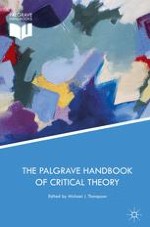2017 | OriginalPaper | Buchkapitel
3. Marx’s Influence on the Early Frankfurt School
verfasst von : Chad Kautzer
Erschienen in: The Palgrave Handbook of Critical Theory
Verlag: Palgrave Macmillan US
Aktivieren Sie unsere intelligente Suche, um passende Fachinhalte oder Patente zu finden.
Wählen Sie Textabschnitte aus um mit Künstlicher Intelligenz passenden Patente zu finden. powered by
Markieren Sie Textabschnitte, um KI-gestützt weitere passende Inhalte zu finden. powered by
